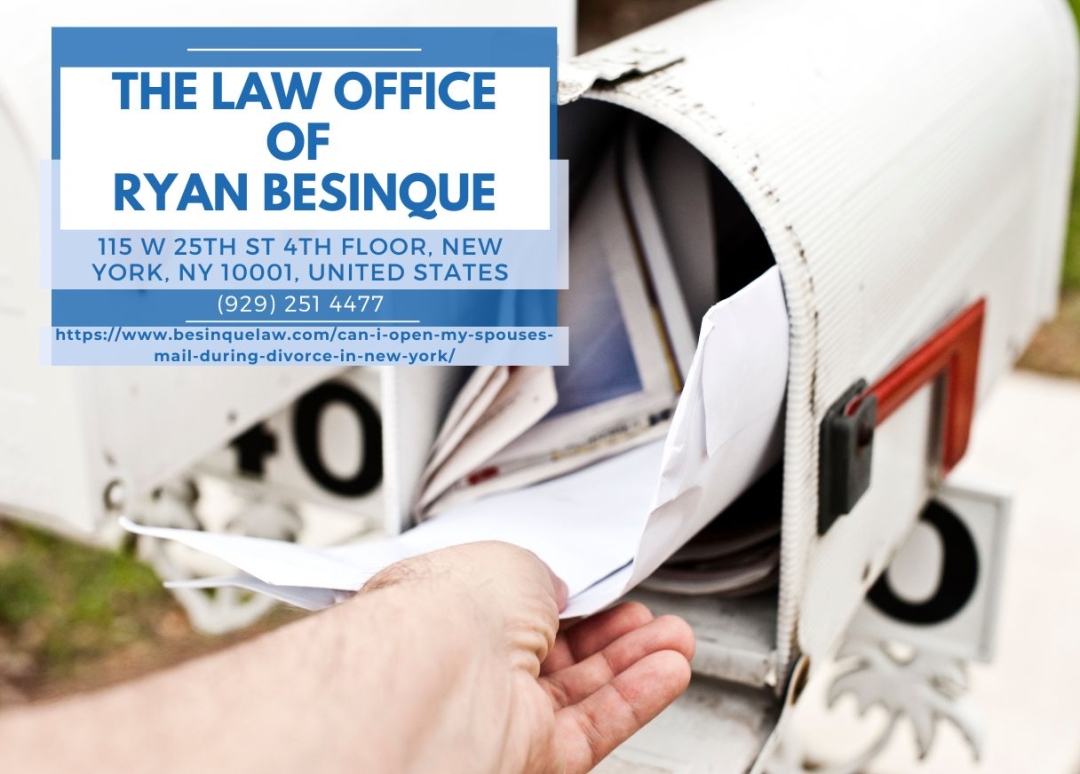Navigating a divorce comes with many legal and ethical questions, including whether one spouse can legally open the other’s mail. Manhattan divorce attorney Ryan Besinque (https://www.besinquelaw.com/can-i-open-my-spouses-mail-during-divorce-in-new-york/) explains the legal implications of mail tampering during divorce and the potential consequences of violating privacy laws.
During a divorce, emotions can run high, and individuals may feel the urge to investigate their spouse’s financial dealings or personal communications. However, federal and state laws protect the privacy of personal correspondence, even between spouses. Manhattan divorce attorney Ryan Besinque highlights that opening mail not addressed to both spouses could result in serious legal repercussions, including fines or imprisonment under federal law.
Manhattan divorce attorney Ryan Besinque advises against taking any actions that could be considered an invasion of privacy. While some spouses may attempt to uncover hidden financial assets or incriminating evidence by intercepting mail, there are legal avenues available to obtain necessary information. The discovery process in divorce litigation allows attorneys to request financial documents, subpoena records, and gather evidence lawfully. Illegally obtained evidence, including mail opened without permission, may not be admissible in court and could harm a party’s credibility in divorce proceedings.
Under 18 U.S. Code § 1702, tampering with mail not explicitly addressed to the individual can be considered a federal offense, punishable by up to five years in prison or significant fines. In addition to federal laws, New York has statutes prohibiting unauthorized access to digital accounts and electronic communications. Gaining access to an estranged spouse’s email or social media accounts without permission could lead to criminal charges under the Electronic Communications Privacy Act or state laws governing unauthorized computer use.
The way a divorce begins often sets the tone for the entire case. Acts such as unauthorized mail access can escalate tensions and make it more difficult to reach amicable agreements regarding asset division, child custody, and support. Maintaining a respectful and legally compliant approach can prevent unnecessary disputes and facilitate a smoother resolution. Manhattan divorce attorney Ryan Besinque explains that cooperation and adherence to legal boundaries can ultimately lead to more favorable divorce outcomes.
There is also an important distinction between jointly and individually addressed mail. Jointly addressed mail, which includes both spouses’ names, can typically be opened by either party. However, mail addressed to only one spouse is legally protected, and opening it without permission may be considered a violation of federal law. Even if spouses previously shared access to mail, that implied permission does not automatically extend into the divorce process.
New York courts recognize the importance of privacy in divorce cases. Judges may take unauthorized mail access into consideration when making decisions about property division, spousal support, or custody arrangements. A history of violating a spouse’s privacy rights could impact a court’s perception of an individual’s credibility and intentions, potentially affecting the final judgment.
To avoid potential legal issues, safeguarding personal privacy is essential during a divorce. Using proper legal channels, such as the discovery process, ensures that all necessary information is obtained without breaking any laws. Manhattan divorce attorney Ryan Besinque advises individuals to take proactive steps to protect their own privacy as well, such as securing personal mail, updating passwords, and discussing any concerns with a legal representative.
For those facing a divorce in New York, understanding legal boundaries is crucial. At The Law Office of Ryan Besinque, individuals receive guidance on all aspects of divorce, from asset division and child custody to privacy concerns and legal compliance. Working with an experienced attorney can help ensure that all actions taken during a divorce align with the law, protecting both rights and future interests.
About The Law Office of Ryan Besinque:
The Law Office of Ryan Besinque provides dedicated legal representation for individuals navigating divorce and family law matters in New York. With a focus on achieving fair resolutions while protecting clients' rights, Ryan Besinque offers personalized guidance through each step of the legal process. The firm is committed to handling cases with integrity, ensuring that clients make informed decisions that align with their best interests.
Embeds:
Youtube Video: https://www.youtube.com/watch?v=tWFgTzsQL4c
GMB: https://www.google.com/maps?cid=3422990479581259264
Email and website
Email: ryan@besinquelaw.com
Website: https://www.besinquelaw.com/
Media Contact
Company Name: The Law Office of Ryan Besinque
Contact Person: Ryan Besinque
Email: Send Email
Phone: (929) 251-4477
Address:115 W 25th St 4th floor
City: New York
State: New York 10001
Country: United States
Website: https://www.besinquelaw.com/







